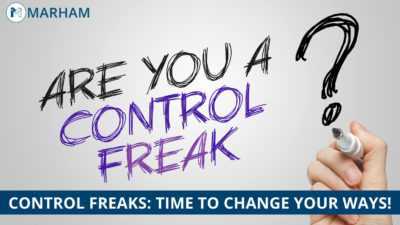If you’re a control freak wondering how not to be a control freak, this blog is just for you! A common trait among people who seek therapy for depression, anxiety, or stress is that they spend a lot of time worrying about things they can’t control. Often, such people worry about other people’s opinions or imagine catastrophic outcomes in their minds. Despite their busy schedules, they feel unsatisfied, and that’s because they’re putting their energy in the wrong places. They try to control their surroundings instead of controlling their emotions.
Some Signs of a Control Freak
Many of us are most at ease when planning, preparing and thinking ahead. However, in particular, high achievers are prone to becoming control freaks. Over time, demanding constant certainty from yourself and others can become tiresome – and, frankly, annoying. Perfectionism, anxiety, and anger are linked to a strong desire for control, which can wreak havoc on your relationships and your happiness.
Following are some signs of a control freak:
Not a Good Team Player
Taking part in a team means letting go of some control. After all, you can’t orchestrate everything that happens when you are responsible for 10% of the outcome. So many control freaks prefer to be lone wolves over team players. When they have to work in a group, they try to control everyone’s behavior right away.


Spend too much Time Convincing People
Most control freaks believe they know best for everyone and try to persuade others to do things their way. They want to make other people act a certain way, whether they lecture, become aggressive, or manipulate things behind the scenes.
Overperform to Get Success
Control freaks believe that they can accomplish anything with enough effort and skill. They don’t believe in luck or timing. When things don’t go as planned, they frequently say things like “Failure isn’t an option,” and they are overly critical of themselves.


Refuse to Delegate
A control freak is a person who believes that if you want something done correctly, you should do it yourself. They are adamant about not delegating tasks. After all, they believe that doing so will require more of their time in the long run because they will have to correct any mistakes made by others. They insist on micromanaging every step of the way if they do delegate.


How to Stop Being a Control Freak
It takes time to overcome your inner control freak. Although letting go is a process, these three steps can assist you in getting started.
Challenge Your Thoughts
Fear leads to distorted thinking, such as catastrophizing (“If this relationship fails, I’ll never recover”) and accepting unjustified blame (“I messed up, so I’ll fix it”). You must replace unhelpful negative thinking with realistic self-talk in order to challenge your need for control.
When you’re thinking something along the lines of:
- Because I made a few typos, my boss will rip this report to shreds.
- The event/party has been ruined because one person has canceled.
Consider the following questions:
- Is my counterargument appropriate?
- What other possibilities do you have [for why they canceled at the last minute / why my boss is upset]?
- How would someone who is more laid-back react?
- What are the worst-case scenarios?
Spoiler Alert: it’s never as bad as you think it’ll be! Negative thoughts can be neutralized to help relieve stress in everyday situations. When you adopt a growth mindset, you’ll notice that you have fewer unexpected disasters (and freak-outs). Because the only thing we have complete control over is our reaction to a situation, changing the way you talk to yourself can help you achieve a more balanced perspective.


Take Baby Steps
You don’t have to relinquish all control all at once, whether you’re managing a project at work or planning a family vacation. Start small instead. Transfer a single project aspect to a colleague. Trust them to do a good job, but remember that you can always provide feedback and correct the situation if they don’t. There is no such thing as an irreversible error. Your comfort zone expands as you witness the benefits of collaboration in action. Gradually, delegating becomes easier.
Begin to ask for help more frequently at home, rather than taking on all responsibilities yourself. Make a to-do list so you can better prioritize your tasks. Begin to refuse people or responsibilities. You make room for a life filled with ease and less difficulty when you let go of what isn’t working.
Take Rest as a Medicine
Those who enjoy having control are more likely to be optimists. They want to get the maximum out of every single day. However, you may become exhausted and burnt out due to doing so. Downtime isn’t a sign of laziness; it’s necessary for producing your best work.
Make time to have fun, let your hair down, and discover new things. Reframe self-care as recovery if you’re having trouble accepting the need for it. It is a well-spent, productive time that’s preparing you for tomorrow’s big challenge.


The Takeaway
It is tough to let go of control as a recovering perfectionist. However, unlike control, resiliency is mentally and emotionally liberating. You gain more time, attention, and focus when you let go of unnecessary worry. Even if you can’t control other people or outcomes, you gain confidence that your greatest strength comes from within.
However, if your urge to control and take charge of every matter has left you in deep sorrow and agony that can lead to anxiety disorder or even depression, contact a psychologist right away! Do not overlook symptoms of burnout and reach out for help.
FAQs
1. What leads to a control freak personality?
Control freaks have a psychological need to be in charge of things and people, even if those things and people are beyond their control. In extreme cases, the need for control stems from deeper psychological problems like obsessive–compulsive disorder (OCD), anxiety disorders, or personality disorders.
2. What do control freaks hate?
Control freaks have a difficult time trusting others or delegating tasks. They despise being surprised. They are afraid that if they don’t exercise control, their lives will spiral out of control. When they are in a situation where they do not have control, they tend to lose it.
3. Is it a bad thing to be a control freak?
It’s not always a bad thing to be a control freak. Being referred to as a “control freak” isn’t exactly a compliment. If you’re a control freak, you may find yourself constantly fighting the urge to exert control over everything and everyone.
Book an appointment now, to answer all your queries. You can book an appointment with the top psychologists in Pakistan through Marham by calling at Marham helpline: 0311-1222398 or by online booking facility through the website or Marham mobile app.
Can’t Find The App?
Android Users:
https://play.google.com/store/apps/details?id=controllers.marham.marhammed&hl=en
Drop a review for us at Playstore if you’ve had a good experience!
iPhone Users:
https://apps.apple.com/pk/app/marham-find-a-doctor/id1095243102
Stay Home. Stay Safe!

